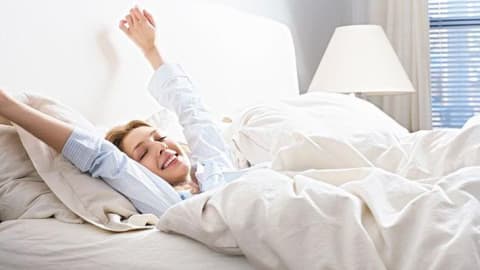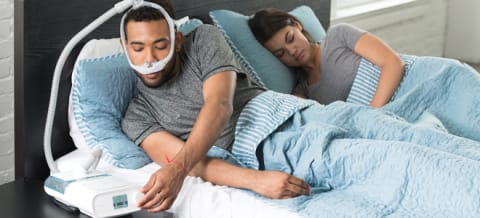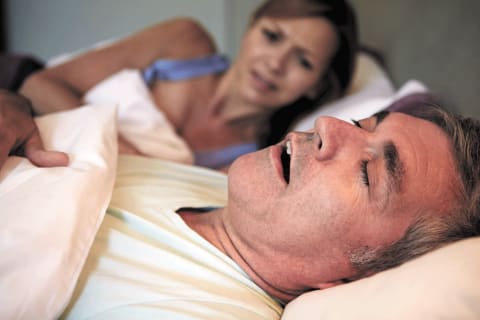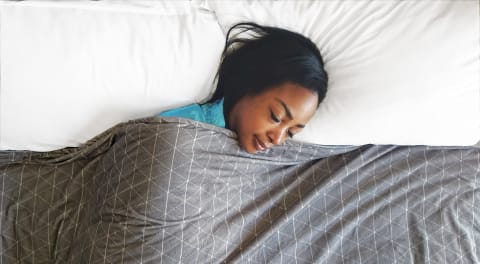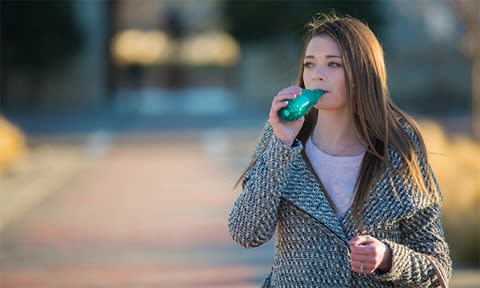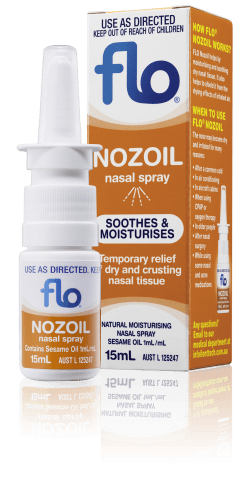What is Sleep Apnea
What is Sleep Apnea?
For many people, a good night’s sleep can feel just out of reach — and sometimes, the reason why isn’t immediately obvious. If you’ve been waking up tired, struggling with daytime fatigue, or getting complaints about loud snoring, sleep apnea could be the overlooked underlying cause.
Sleep apnea is a common but often condition that affects breathing during sleep. It can have a significant impact on your health, energy, mood, and even your safety — but the good news is that it’s treatable, especially when diagnosed early. At Sove CPAP Clinic, we help people across Australia understand their sleep health, access trusted testing options, and find personalised treatment solutions.
On this page, we’ll explain what sleep apnea is, how to recognize the signs, and what to do if you think it might be affecting you or a loved one.
Sleep Apnea Is a Sleep Disorder
Sleep apnea (also spelled sleep apnoea) is a sleep disorder in which your breathing is interrupted multiple times during the night. These pauses in breathing — called apneas — can last from a few seconds up to a minute or more. They disrupt your natural sleep cycle and prevent your body from getting the deep, restorative rest it needs.
There are three main types of sleep apnea:
- Obstructive Sleep Apnea (OSA): The most common form, caused by the airway collapsing or becoming blocked during sleep.
- Central Sleep Apnea (CSA): Occurs when the brain doesn’t send proper signals to the muscles that control breathing.
Complex Sleep Apnea: A combination of both obstructive and central elements.
When breathing stops, the brain sends a jolt to wake the body just enough to reopen the airway — often without the person being fully aware. These constant interruptions prevent restful sleep and lead to daytime tiredness, memory issues, and a range of other health concerns. Many people are unaware until a partner notices unusual sleep behaviours or until a sleep study reveals the issue.
Common Symptoms Include Loud Snoring, Choking During Sleep and Daytime Fatigue
Sleep apnea can present in different ways depending on the person, but there are several common signs that may point to a problem:
- Loud, persistent snoring
- Gasping or choking sounds during sleep
- Pauses in breathing observed by a partner
- Morning headaches or dry mouth
- Difficulty concentrating or remembering things
- Excessive daytime sleepiness or fatigue
- Mood changes, irritability, or depression
- Poor sleep despite spending enough time in bed
Some people may also experience night sweats, insomnia, or restlessness. For others, especially those who live alone, the only noticeable symptom may be daytime exhaustion.
Sleep apnea doesn’t just affect your nights — it can have a ripple effect on your overall wellbeing. People with untreated OSA are at greater risk of high blood pressure, heart disease, type 2 diabetes, and motor vehicle accidents due to fatigue.
If any of these symptoms sound familiar, don’t ignore them. A simple sleep study can help you understand what’s going on while you sleep — and provide the first step toward feeling better during the day.
Sleep Apnea Diagnosis
Because sleep apnea symptoms often overlap with other conditions, the only way to confirm a diagnosis is with a sleep study. In Australia, this can be done either in a clinic (Level 1) or at home (Level 2), depending on your needs and clinical history.
Here’s how the process works:
- Consultation: Speak with your GP or a sleep health professional about your symptoms.
- Referral: If sleep apnea is suspected, your GP can refer you for a sleep study.
- Testing: A sleep study records your breathing, heart rate, oxygen levels, and movement while you sleep. Home-based studies are often more convenient and still highly accurate.
- Results & Review: A sleep specialist analyses the data and confirms whether you have sleep apnea — and if so, what type and how severe.
In most cases, people diagnosed with moderate to severe OSA benefit from CPAP therapy, though alternatives like lifestyle changes, oral appliances, or positional therapy may also be considered.
CPAP Therapy for Obstructive Sleep Apnea
If you’re diagnosed with obstructive sleep apnea, your doctor or sleep specialist may recommend CPAP therapy. CPAP stands for Continuous Positive Airway Pressure — a treatment that keeps your airway open while you sleep.
A CPAP machine works by delivering a gentle stream of pressurized air through a mask, preventing the airway from collapsing. This means no more pauses in breathing, better oxygen levels, and a more restful night’s sleep.
Using CPAP can feel strange at first, but most patients adjust quickly. The benefits — like waking up refreshed, feeling mentally sharper, and reducing long-term health risks — far outweigh the initial adjustment period.
Sove CPAP Clinic provides CPAP trial machines, professional fittings, and one-on-one support to help you succeed with CPAP. We also offer our CPAP Care Plans, which not only make CPAP more affordable, but they include regular follow-ups, mask replacements, and ongoing education.
ALWAYS FOLLOW THE DIRECTIONS FOR USE. CPAP is used for Obstructive Sleep Apnoea treatment. When considering whether a sleep study or CPAP is right for you, speak to your doctor. Medicare criteria and T&Cs apply. Payment plans available for approved applicants only; fees, terms, conditions, minimum amounts and exclusions apply.
Frequently Asked Questions
What’s the difference between Obstructive, Central, and Complex Sleep Apnea?
Obstructive Sleep Apnea (OSA) occurs when the airway becomes physically blocked during sleep, often due to relaxed throat muscles or excess tissue in the airway. It’s the most common type.
Central Sleep Apnea (CSA), on the other hand, is caused by a communication issue between the brain and the muscles that control breathing. The brain fails to send the right signals, so breathing pauses even though the airway is open.
Complex Sleep Apnea is a combination of both — typically starting as OSA but revealing central events once CPAP therapy begins. This is sometimes referred to as treatment-emergent CSA.
A sleep study will help distinguish which type of apnea you have, ensuring you receive the most appropriate treatment. Sove CPAP Clinic can assist with diagnosis and ongoing therapy.
What are the long-term risks of untreated Sleep Apnea?
Sleep apnea isn’t just about snoring or poor sleep — over time, it can lead to serious health complications. People with untreated OSA are more likely to experience:
- High blood pressure (hypertension)
- Heart disease and irregular heart rhythms
- Stroke
- Type 2 diabetes
- Weight gain or difficulty losing weight
- Impaired memory and cognitive decline
- Increased risk of accidents due to daytime fatigue
The constant interruption of oxygen supply puts strain on the body’s systems and can worsen existing conditions. That’s why early diagnosis and treatment are so important.
Is loud snoring always a sign of Sleep Apnea?
Not necessarily. While loud, chronic snoring is one of the most common symptoms of OSA, not everyone who snores has sleep apnea. Snoring becomes a concern when it’s accompanied by:
- Gasping or choking during sleep
- Observed pauses in breathing
- Excessive tiredness during the day
It’s also important to note that people with sleep apnea don’t always snore — especially if their apnoeas are central in nature.
If snoring is disrupting your life or your partner’s, it’s worth investigating. A sleep study is a safe, non-invasive way to find out what’s really going on.
Can children and young adults have Sleep Apnea?
Yes, sleep apnea can affect people of all ages — including children and young adults. In children, it’s often linked to enlarged tonsils or adenoids and can present with symptoms such as:
- Restless sleep
- Mouth breathing
- Snoring
- Bedwetting
- Behavioural issues or attention difficulties
For teenagers and young adults, factors like weight, facial structure, or nasal blockages can contribute.
If you’re concerned about a child’s sleep, talk to your GP or reach out to a clinic like Sove for advice. We can arrange age-appropriate sleep studies and help you explore the next steps.
Can I do a sleep study at home or do I need to go to a clinic?
You have options. In many cases, a home sleep study is enough to diagnose obstructive sleep apnea, especially if you have clear symptoms and no major underlying health conditions. These studies are comfortable, easy to use, and allow you to sleep in your own bed while collecting accurate data.
More complex cases or those involving multiple health issues may require an in-lab sleep study, which offers more detailed monitoring under supervision.
Sove Tip: Sove CPAP Clinic offers both types of studies and can help you decide which is right for you. We also assist with referrals and Medicare rebate options.
How quickly can CPAP treatment improve my sleep quality?
Many people notice a difference within just a few nights of using CPAP. Improvements may include:
- Deeper, more restful sleep
- Reduced snoring
- Less daytime fatigue
- Clearer thinking and better mood
For others, it can take a few weeks to fully adjust to the therapy — especially if mask fit or pressure settings need fine-tuning. That’s why follow-up care and support are so important.

